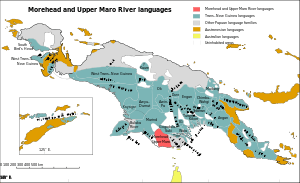Yam languages
| Yam | |
|---|---|
|
Morehead and Upper Maro Rivers Morehead–Wasur | |
| Geographic distribution: | New Guinea |
| Linguistic classification: |
|
| Subdivisions: |
|
| Glottolog: | more1255[1] |
|
Map: The Yam languages of New Guinea
Yam languages
Trans–New Guinea languages
Other Papuan languages
Austronesian languages
Australian languages
Uninhabited | |
The Yam languages, also known as the Morehead and Upper Maro River languages, are a family of Papuan languages. They include many of the languages south and west of the Fly River in Papua New Guinea and Indonesian West Papua.
The name Morehead and Upper Maro River refers to the area around the Morehead and Maro rivers. Most of the languages are found between these rivers, but the Nambu subgroup are spoken east of the Morehead. Evans (2012) refers to the family instead with the more compact name Yam. This name is motivated by a number of linguistic and cultural items of significance: yam (and cognates) means "custom, tradition"; yəm (and cognates) means "is"; and yam tubers are the local staple and of centralcultural importance.
Ross (2005) tentatively includes the Yam languages in the proposed Trans-Fly – Bulaka River family. More recently (Evans 2012) has argued that this is not justified and more data has to be gathered.
Classification
| Yam |
| |||||||||
| |
Pronouns
The pronouns Ross reconstructs for the family are,
- Proto-Yam (Proto–Morehead – Upper Maro)
I/we *ni you *bu s/he/they *be
See also
References
- ↑ Nordhoff, Sebastian; Hammarström, Harald; Forkel, Robert; Haspelmath, Martin, eds. (2013). "Morehead–Wasur". Glottolog. Leipzig: Max Planck Institute for Evolutionary Anthropology.
- Ross, Malcolm (2005). "Pronouns as a preliminary diagnostic for grouping Papuan languages". In Andrew Pawley, Robert Attenborough, Robin Hide, Jack Golson, eds. Papuan pasts: cultural, linguistic and biological histories of Papuan-speaking peoples. Canberra: Pacific Linguistics. pp. 15–66. ISBN 0858835622. OCLC 67292782.
- Evans, Nicholas (2012). "Even more diverse than we had thought: The multiplicity of Trans-Fly languages". LD&C Special Publication (University of Hawai'i Press) 5: 109–149.
